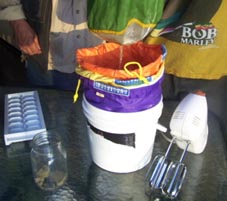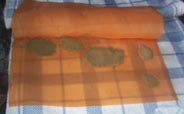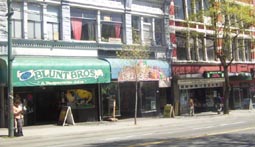
By Chris Fowlie, President, NORML New Zealand, 2002
After the annual NORML conference held in the medical marijuana capital of San Francisco, I headed north to Vancouver, home of the B.C. Bud and the city recently voted by High Times readers as the most marijuana-friendly place on earth.

Upon arrival I called in to see Cannabis Culture publisher Marc Emery, who also owns a large marijuana seed mail-order company and funds most Canadian law reform efforts. I managed to arrive with impeccable timing. A potential supplier had sent over an ounce each of 25 different strains to Marc for his consideration. “Any kind of marijuana you’ve always wanted to try?” he asked, passing me a 3 foot colour-changing glass bong. I got to work immediately.

The next day I visited the downtown Hastings Street area which is home to Vancouver’s cannabis community. A couple of pot-friendly cafes and a seed store flank the BC Marijuana Party. It’s effectively a a prohibition-free zone in this city where the law still says pot is illegal.
Blunt Brothers and Cafe Amsterdam don’t sell cannabis, but they will happily let adults use their glassed-walled smoking rooms. Vancouver has strict anti-tobacco laws that restrict any smoking indoors and these sort of rooms were first installed in a few bars around town. After several cannabis-related raids, the cannabis cafes argued that if bars could have tobacco smoking rooms then they should have pot smoking rooms, and the local police agreed. They have more important things to get on with, and can keep an eye on the cafes and visit them if necessary.
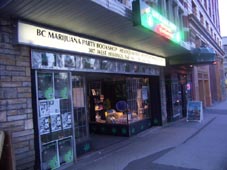
Activists at the BC Marijuana Party make sure everyone who visits gets to try their giant bongs. They have a great bookstore and house the studio for www.pot-tv.net, an internet site largely funded by Marc Emery that broadcasts pro-pot programmes over the internet. I caught up with Reverend Damuzi who I had met in New Zealand in 1999 when he covered the last election for Cannabis Culture magazine. Damuzi has a daily show on pot-tv.net and I was happy to be interviewed by him and give an update on what we have been up to in New Zealand.
Vancouver also has a thriving medical marijuana scene. Hillary Black runs the Compassion Club, which aims to provide “access to medical marijuana in an environment conducive to healing”. The Club has a good selection of organic cannabis, both indoor and outdoor, plus some hash and baked delights all at very reasonable prices, but only if you have a letter from your doctor. A registered non-profit society, the Compassion Club also offers naturopaths, massage, reiki and other alternative healing for their patients. They work closely with the health department and have pioneered systems of evaluating and monitoring patient’s med-pot usage and the effects of different strains.
Unlike the Californian medical clubs, the Vancouver Compassion Club does not have the protection of any law, but they do have around 2000 members and makes them almost untouchable by the authorities. They are, after all, only doing what the Canadian government has failed to do.
Two Supreme Courts, in Ontario and Alberta, have ruled that because the law does not distinguish between medical and recreational use of cannabis, it is unconstitutional and will be struck down. The Minister of Health responded by announcing they would provide medical marijuana on prescription. A $6.5 million contract was awarded to Prairie Plant Systems to grow the medical herb underground in an old mine shaft, but instead of using the standardised strains offered by seed companies such as Marc Emery’s, they took an unknown mix-bag of seeds from police seizures. While I was in Vancouver the news emerged that the whole crop will probably be destroyed as they have grown something like 180 different strains, all with varying cannabinoid profiles and therefore different therapeutic effects. Meanwhile, the Compassion Club already has a wealth of data they have collected from their patients about which particular strains work the best for their conditions…
While I was in Canada, the Senate Special Committee on Drugs released a discussion paper supporting marijuana decriminalisation, saying there is no scientific evidence that it leads to harder drugs. After more than a year of studying the issue, Committee chairman Sen. Pierre Claude Nolin said marijuana should be treated “more like alcohol or tobacco than like the harder drugs.”
Their inquiry report noted that “studies show that in the Netherlands, despite a more liberal approach than other countries’, the proportion of youth using cannabis is not higher. In fact, it is in the middle of the pack… Public policies have little impact on use levels and patterns… Prohibition and criminalization entail a criminal record for simple cannabis possession, fuel a black market that brings young people into contact with criminal elements and force them to hide to avoid police scrutiny… Public policies also entail other negative effects. Prohibition makes public health approaches, balanced information, prevention and quality control of substances difficult, if not impossible.” The committee will issue their final report in August.
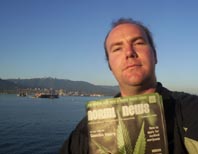
In the BC capital city of Victoria on near-by Vancouver Island, I paid a visit to Philippe Lucas, founder of the Vancouver Island Compassion Society (VICS). Phil is facing charges of intent to supply his 170 members after he reported a break-in at the club. Instead arresting the burglar and returning VICS’s stolen medi-weed, local police arrested Phil. An almost identical theft occurred at the Vancouver Compassion Club but they have 2000 members so their medical marijuana was returned by the police with no charges laid.
I attended the latest hearing in Phil’s ongoing trial at the Victoria courthouse. The judge seemed sympathetic and the prosecutor reluctant. A 45-minute documentary about Phil and the VICS called Crime of Compassion was played. In it, then-Minister of Health Allan Rock said “Philippe can show [the government] the way in this transition period… In the next round of regulations, we should recognise the clubs who have shown commitment, kindness and involvement at the community level.” Phil’s lawyer James Conroy, who is also Canadian spokesperson for NORML, argued that Allan Rock was not just turning a blind eye, but “watching, encouraging and thanking Mr Lucas for his work and contribution.” Conroy asked Judge Higgenbottam for an absolute discharge “to send a message to police to stop arresting people with genuine medical need.” The prosecutor opposed, saying that since Phil continued to operate the the club, he was unrepentant. The judge wondered aloud whether remorse was such an appropriate measure with which to decide a discharge. He reserved his decision and we left the courthouse feeling quite confident of a good outcome.
In Victoria I was stayed with David Hadorn, who had initiated the Drug Policy Forum in New Zealand and was the principal author of their seminal 1998 report, Regulate and Tax Cannabis. Much of our conversation revolved around what policy we could make work in New Zealand. After much toking and talking, our ideas started to coalesce around a private club model, where smoking could be allowed inside member’s clubs similar to RSAs or sports clubs. The club would be private, behind closed doors and limited to adults. If you’re not a member you won’t get in without being invited, and if you don’t want to go there you don’t have to. Membership could also involve a test of knowledge of responsible cannabis use and adhering to a set of club rules defining appropriate behaviour.
David pointed out that the home grow model carries a potential risk in that if half a million pot smokers all grow a few plants at home or in the hills, there will be a lot of cannabis plants out there and therefore it could be argued that access by kids could become even easier than now. A private club could avoid this pitfall by doing all the growing on behalf of members in a secure environment. The members would pay their share of expenses and could either tend the plants themselves or have the club’s expert growers do it for them.
It’s a valid point, but after so many years of campaigning for the right to grow your own, I still wasn’t convinced this was the best policy that we would want the law changed to. After all, people can brew their own beer or distill hard liquor or grow tobacco and the only controls are being aged over 18 and not being able to sell the product without a license.
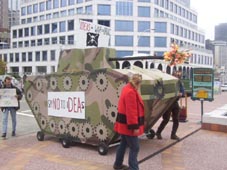
I got the ferry back to Vancouver in time for the IDEAS conference. This was a pro-War On Drugs event organised by an American outfit descended from Straight Inc, a “rehab” outfit that was closed after allegations of beatings and torture became public. The conference did not get much support in liberal ‘Vansterdam’ and a bunch of activists mounted a noisy – and smokey – protest outside the plush hotel venue.
I had the good fortune while there to meet Mark, manufacturer of the Bubble Bag hash extraction system, and went back to his place for a demonstration. He lined a large bucket with six silk-screen bags, one inside the other, then filled it with water and ice. Mark then took two ounces of heads (leaf can also be used) and to my initial consternation he threw the buds in the water. “Relax,” he said, “just wait, you’ll like the hash better.” A hand-held cake mixer was used to agitate the icey water for twenty minutes in order to break the trichomes from the plant material. The trichomes separate more easily at colder temperatures so ice was liberally added. The mixture frothed up and then we let it settle for another twenty minutes or so. The screen of the first bag is wide enough to let only the trichomes and the water go though, so it contained all the plant material which we discarded. The next five bags yielded five different grades of hash, and the final 25 micron bag was mind-blowing! I was instantly sold on the idea: growers of New Zealand, get your bags and get making water hash!
The next day the first annual Toker’s Bowl kicked off. It was a three-day extravaganga hosted by Cannabis Culture and the Marijuana Party, with dozens of strains competing to be crowned the finest of the BC Bud. I caught the smoke-filled opening – Mark was there demonstrating his hash with a heat-gun vaporiser – but I couldn’t stay. I had a plane to catch to get to London in time for J Day. >>


